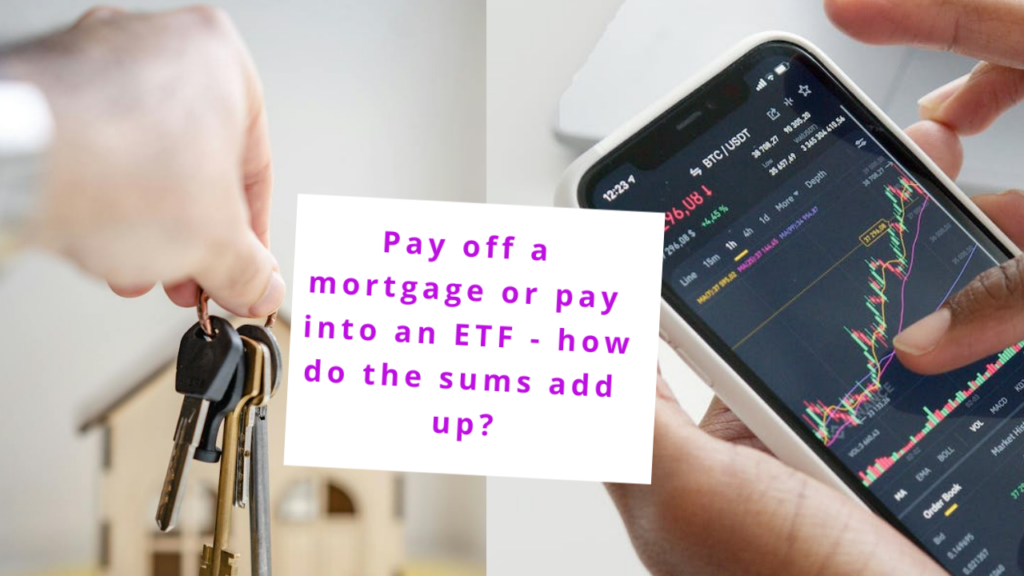
If you are one of the tens of thousands of mortgage holders impacted by higher monthly repayments, you might be tempted to do everything in your power to take back control. For those with a little extra cash, paying down that mortgage is a tempting option.
But what about investing? Might that provide a better financial alternative?
Irish investing landscape
In Ireland, for personal investments accounts, those are heavily taxed.
For starters, there is almost NO tax-free growth. Presently, the maximum available is €1,270 in any given year which does not accumulate.
Separately, the rate of tax ranges from between 33% (capital gains) to 41% (exit).
By comparison, if you were based in the UK or US, the tax-free allowances would be significantly higher (in the U.K. Stg£6,000 and in the U.S., those with income less than US$47,000 are not liable for capital gains tax). Additionally, the tax applied on gains in the U.K. and U.S. is roughly HALF the higher rate applied in here Ireland. In other words, significantly more scope to earn tax-free growth and a fraction of the tax on gains. It is a point returning emigrants often cite.
Another problem that Ireland presents to would-be investors is the ‘deemed disposal’ rule. Here, on the 8th year of their investment, a person invested in a diversified ETF must declare their investment growth and pay the applicable tax, despite not having sold any part of their investment.
To meet the tax obligation, they are forced to either liquidate part of their portfolio, which impacts the overall performance of the fund strategy or dip into personal savings. It’s a very messy requirement that makes it off-putting for some people and, messy in the sense that it trips up an investment strategy.
So, when it comes to the question of paying into an index-linked ETF, the numbers are interesting.
Working the numbers
Let’s assume a person has €400 per month to either invest into an ETF or pay off a mortgage.
They have 10 years left on their mortgage with a rate of interest of 4.5% and €120,000 outstanding.
So, this will be a 10-year project to grow their investment portfolio or cut the amount of interest they pay on their mortgage.
The savings on a mortgage
Using the €400 to overpay the mortgage will generate a net savings of €8,760.
If the rate of interest is 6.5%, the savings increase to €13,388.
Of course, if the balance on the mortgage were higher, then the savings would rise also. So, a mortgage with a remaining balance of €150,000 costing 4.5% would see savings of €9,327. Or savings of €14,284 if the rate of interest is 6.5%.
The possible gains on an investment
Redirecting the €400 into an ETF (let’s say index-linked, S&P for example), the expected rate of growth over a 10-year period should be in the 8% range. Keep in mind that the amount equals €4,800 per year for each of the 10 years so the rate of growth accumulates longer for the first year than it does for the second, third and so on. Plus, for some of the investments, especially in the 8th, 9th and 10th years, there is ‘deemed disposal’ trigger and its impact that must be factored in. Here, one can either sell part of the portfolio to settle the tax bill or pay it from another source (like savings) which means the investment remains intact and can generate a greater yield.
The numbers
In general, the ETF approach should generate a net return of about €16,500. This factors in the tax-free allowance of €1,270 where the ‘deemed disposal’ tax was paid from savings (as opposed to liquidating the fund).
Comparison
So, the overpayment of the mortgage might generate interest savings of between €8,760 and €13,388 depending on the remaining balance and the rate of interest (using the €120,000 balance assumption). Investing in the ETF could generate a net profit of about €16,500. Both assumptions are based on a monthly allocation of €400.
One last point It is also important to keep in mind that while paying off a mortgage means full ownership and a clear title on the family home, property is an illiquid asset. An ETF is a liquid asset and can be cashed in at short notice. From a financial planning perspective, this is an important point that should not be overlooked.
Frank Conway is a Qualified Financial Adviser and founder of MoneyWhizz – the financial literacy initiative

Comments are closed.